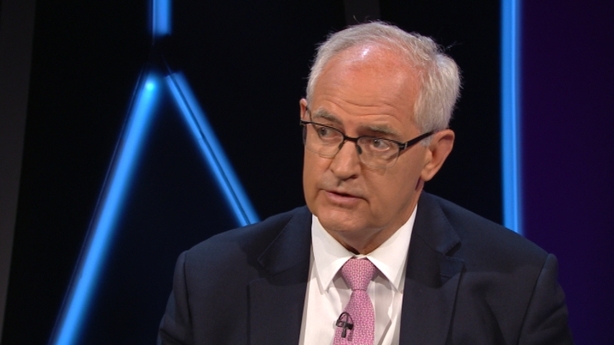Factories legislation in Ireland used to decree that women couldn't lift a weight over 35.2 pounds. Now, that was the weight of a 2-and-a-half-year-old child, that mothers would lift every day.
And while the restrictions may have been well-meant, they were used routinely to exclude women from the more skilled jobs and apprenticeships in industry, even where the lifting of weights did not arise.
As a result, I'd always make a point of doing my own lifting, particularly of the heavy typewriters in the Irish Times office. One day when I was pregnant and looking a bit doubtfully at moving the old typewriter, one of the young copy boys came over like a flash.
"But I usually carry it myself", I said. "I know", he muttered. "But I'll carry it for you just now."
He made it his job after that and I hope he knows how much I appreciated the quiet way he did it and I hope he's forgiven me too for making him blush in front of his pals by saying naff things like "your parents would be proud of you".
I still remember him as offering me a moment of solidarity and support, a young man who did that without my having even to ask. Just as I remember the male colleague who came and stood in front of a pregnant me as the crowd rushed the platform at a Charlie Haughey Fianna Fáil Ard Fheis.
"I'll be your human shield", he said. And he was.
I was warmed by that – just as I was warmed by the 66% of men who voted with 72% of women last Friday to ensure that women had greater control over their own bodies. Yes, there were incidents like the young woman wearing a 'Yes' sticker who was punched in the stomach by an angry older man who walked on and left her winded.
And the story of the group of rugby fans who shouted that they wouldn’t vote for Repeal because of the way that women had responded to the Belfast rape trial.
But 66% includes a lot of rugby fans. And a lot of older men, without whom this could not have been done. This wasn't a war between the sexes. It didn't divide the country. And it shouldn't now.
And that's why I didn't open a bottle of champagne on Saturday night. I went quietly to bed. Some of my good friends, some of the people who are dear to me, voted 'No' for sincere reasons of conscience.
They'll be hurting enough today without the winners gloating. Adolescents gloat. Not grown-ups. And hopefully we're becoming a more grown-up country.
One of the signs of that was the careful taking of evidence by the Citizen's Assembly and the all-party Oireachtas committee and their reports based on the evidence they'd heard. Evidence-based policy-making is what grown-up nations do.
One of the results of that was the more respectful tone of debate when compared to 1983. But there were other differences from '83. 35 years ago, the Roman Catholic Church played a leading part in the anti-abortion campaign. And the senior hospital consultants played almost none.
This time, those roles were reversed, showing the declining power of the church over our hospitals.

The Masters of the National Maternity Hospital and the Rotunda were leading spokespeople for 'Yes', as were Peter Boylan, the former Master of the National Maternity Hospital, his colleague obstetrician Professor Mary Higgins and Chris Fitzpatrick, Former Master of the Coombe.
And it was interesting to see consultants, who are not used to having their authority questioned, having to mix it in the public arena and pick up the battering that goes with that. Bruised or not, they were absolutely crucial to the 'Yes' campaign.
So were the long-time warriors who've never stopped campaigning on this issue. The redoubtable academic Ailbhe Smyth, Senator Ivana Bacik, former Supreme Court Judge Catherine McGuinness and the Labour Party, who fought against putting the abortion ban in the Constitution when they were in government in 1983 and have made repeal of it part of official party policy ever since.
There were also TDs, like Bríd Smith and Clare Daly, who have raised it constantly in the Dáil since they were elected.
In the recent campaign, the stand-out political performers were Micheál Martin and Mary Lou McDonald on the opposition benches and Simon Harris, Regina Doherty and Leo Varadkar on the government side.
But there's a reason that we all recognise that the women who told their stories were the big influence in this campaign.
Why? Because they changed the narrative. They talked about things that no-one had really described before. They put heart-broken parents dealing with a baby who won't survive birth into the picture. They put women with crisis pregnancies into the picture. And they had nothing to gain from coming out and reliving their grief, nothing to gain at all but a change of policy which would help others.
And they'll be at home now, putting back together lives which were never meant to be exposed to public scrutiny. Brave people who helped to change this country. For Irish women and for Irish men.
We need your consent to load this rte-player contentWe use rte-player to manage extra content that can set cookies on your device and collect data about your activity. Please review their details and accept them to load the content.Manage Preferences
This column was broadcast on Drivetime on Tuesday, May 29th, 2018. Listen back to the full programme here.








